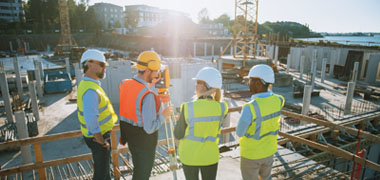
This role has a high level of AI exposure. While some human skills are required, many tasks could be automated or replaced by new technology.
Explore all careersA Structural Engineer designs, tests, and ensures the safety of structures, selecting materials and overseeing development while ensuring compliance.
Get qualified to work as a Structural Engineer with a course recognised across Australia. Speak to a training provider to learn more.






In Australia, a full time Structural Engineer generally earns $2,270 per week ($118,040 annual salary) before tax. This is a median figure for full-time employees and should be considered a guide only. As you gain more experience you can expect a potentially higher salary than people who are new to the industry.
 Courses.com.au Team
Courses.com.au Team
The number of people working in this field is expected to grow strongly in coming years. There are currently 6,200 people working in this field in Australia and many of them specialise as a Structural Engineer. Structural Engineers may find work across all regions of Australia.
Source: Australian Government Labour Market Insights
 Courses.com.au Team
Courses.com.au Team
If a career as a Structural Engineer interests you, consider enrolling in a Bachelor of Engineering (Civil) (Honours). This course covers a range of topics including sustainable design, engineering in society, engineering maths and physics, field investigation, modelling, structural design, stress and failure analysis, road and pavement engineering, structural theory, hydrology and hydraulics, concrete and steel structures and geotechnical engineering.
 Courses.com.au Team
Courses.com.au Team
Browse occupations related to Structural Engineer



For those seeking to embark on a career in engineering, the Structural Engineer courses in Central Coast offer a robust foundation and specialised knowledge necessary for success in the field. With 12 different courses available, ranging from beginner levels to advanced qualifications, there is an opportunity for every aspiring structural engineer to find the right fit. Notable options include the Professional Certificate of Competency in Geotechnical Monitoring and Structural Instrumentation and the Professional Certificate of Competency in Repair of Concrete for those just starting their journey.
Experienced individuals can also advance their skills through a variety of higher education options such as the Graduate Certificate in Civil Engineering: Structural or the esteemed Master of Engineering (Civil: Structural). With qualifications from well-respected providers like The University of Sydney and UTS, learners can feel assured they are receiving quality education relevant to their career aspirations in Central Coast, 2260 Australia.
As you consider the available Structural Engineer courses in Central Coast, it’s also beneficial to explore connected job roles that may interest you. From a Civil Engineer to a Planning Engineer, the pathways are varied and rewarding. Each role plays a pivotal part in the construction and engineering ecosystem, providing multiple avenues to channel your skills and knowledge into practical outcomes within the community.
The training provided in Central Coast not only equips learners with technical expertise but also prepares them for the dynamic landscape of engineering practices. Individuals looking to specialise further can consider courses leading to roles such as Geotechnical Engineer or Structural Project Manager. Such roles bridge the gap between design and implementation, making the skills acquired through these courses exceptionally relevant in today's job market.
By choosing a suitably aligned programme through the available Structural Engineer courses in Central Coast, learners can enhance their employability in a highly competitive sector. With courses available for both beginners and seasoned professionals, Central Coast stands out as a vibrant location for engineering studies, guided by respected training providers such as UON. It’s a promising entry point into a fulfilling career that shapes the infrastructure of our cities.